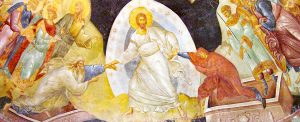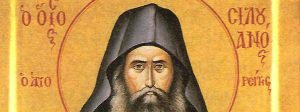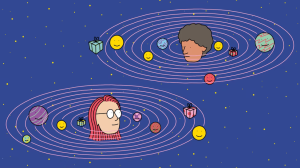A friend wrote:
In the Orthodox services I have visited, I’ve heard a hymn or prayer saying, “Most holy Theotokos, save us.” I know “Theotokos” means the one who gave birth to Christ, but what do you mean by asking a human to “save us”?
Preserve, heal, deliver, rescue, help… those are what the word sōzō or “save” means.
Christ told one person “Your faith has made you whole” and another person “Your faith has saved you” but both sentences are identical in the original Greek. It’s only the translators that felt the need to render them differently.
Christ’s work is utterly unique. Nobody else is capable of bursting death and hades open from the inside, uniting mankind to God in one eternal divine-human Person, and seating human nature on the throne of the Trinity. In that sense Christ is absolutely the only Savior.
But the writers of Scripture also tell us:
- Paul saves some (Romans 11:14, 1 Cor 9:22)
- Timothy can save those who hear him (1 Timothy 4:16)
- Spouses may save each other (1 Cor 7:16)
- Baptism saves us (1 Peter 3:21)
- The word, implanted in us, will save our souls (James 1:21)
- Prayers of presbyters save the sick (James 5:15)
- Jude commands us to save others (Jude 1:23)
- Those who turn sinners from error save them (James 5:20)
Salvation [sōtēria] was a Greek religious term long before Christianity, but outside of a religious context it was also used in daily speech without any religious connotations. See Matthew 8:25, 14:30; Acts 27:20,31,43.

If I fall off the edge of the dock, and I call “Help! Save me!” I don’t mean “Be crucified for me!” I mean, “Throw me a life ring! I’m drowning, pull me out!” Certainly no one will stand by saying “No, no! Christ is the only Savior, you mustn’t ask us!” And if you do throw me a float or pull me out, then you’ve certainly saved me. God will not be offended by my asking your help, or by my thanking you for it.
That’s what we mean when we sing “Most holy Theotokos, save us” in Orthodox services: Help, rescue, preserve, heal us.
Have any of the saints got the power to help or save us in any way? In Acts 3, Peter and John go up the temple to pray the Ninth Hour prayers. They see a crippled man, who begs them for money. Peter does not stop and pray, “O Lord, by Thy sovereign power and Thine alone, heal him.” Instead, knowing the will of God, and full of divine grace, Peter heals him himself: “I haven’t got any money but I’ll give you what I do have – Get up and walk!” Of course Peter knows it’s not his own power or holiness that made the man walk (v.12-13) but he’s so full of the power of God that when he speaks according to the will of God, it’s done. Peter has become a participant in the nature of God (2 Pt 1:4) and acts and speaks in His name.
We ask the saints to agree with us in prayer. But since they’re more holy and full of the power of God than we are, we also ask them to intervene and save us. This is one of the ways that “God is glorified in his saints” (2 Thessalonians 1:10).






